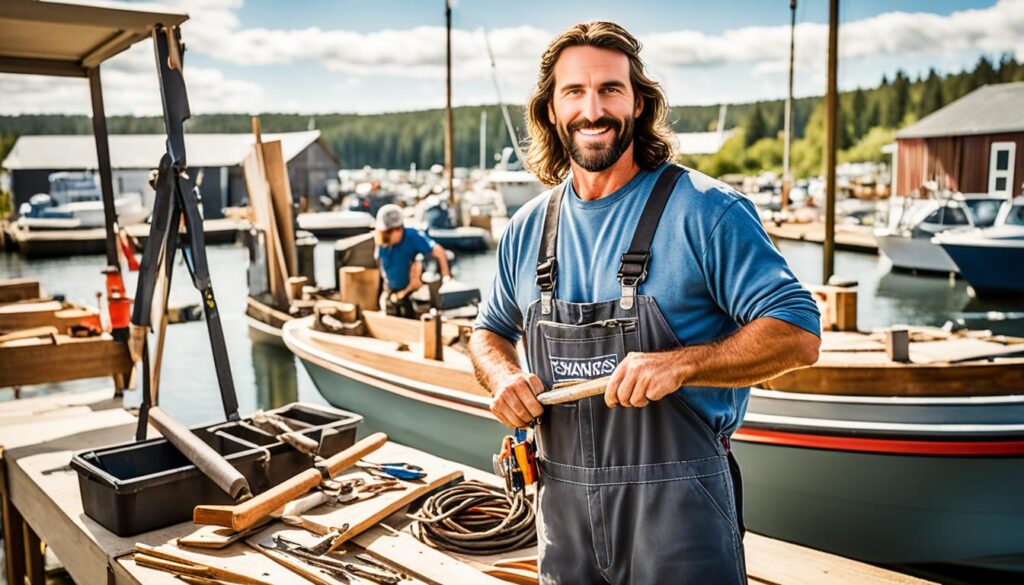People often wonder about Jesus’s real job. Was Jesus a fisherman or a carpenter? Most think of him as a carpenter. Yet, some believe he did more than work with wood.
In Greek, the word “tektōn” describes Jesus’s job. It means a builder or someone who works with many materials, including wood, stone, metal, thatch, and plaster. So, Jesus might have had skills in various construction areas, not just carpentry.
In Nazareth, where Jesus lived, trees were rare, so it’s unlikely that woodwork was his main job. It’s possible that Jesus worked with stone instead. His teachings often mention stones and rocks, suggesting he knew much about masonry.
Being a builder or mason gave Jesus unique experiences. These influenced his lessons on wages and the importance of building solid foundations. His background helped shape his teachings.
Teachings:
- The word “tektōn” used to describe Jesus’s profession implies a broader skillset than carpentry.
- Jesus may have been involved in various construction practices, including masonry and stonework.
- The scarcity of trees in Nazareth suggests that woodwork may not have been as typical as other materials.
- In his teachings, Jesus’s references to stones and foundations indicate a connection to construction.
- Working on construction projects would have influenced Jesus’s teachings on wages, hiring and firing, and building projects.
Fishing as a Metaphor in Jesus’ Teachings
Jesus wasn’t a fisherman, but fishing was vital in his lessons. Take the story of Peter. Despite being a skilled angler, Peter caught no fish all night. When Jesus told him to try again, they got a huge haul.
This story teaches us about listening, trust, and belief. Like Peter, we must listen and have faith, even when it’s tough. It shows how disciples are “fishers of men” with a mission to spread Jesus’ message. Jesus used fishing to show the power of sharing his word. He saw potential in Peter’s empty net as he does in each of us. Being a fisherman or a follower means patience, persistence, and reliance on God.
Natural fishing tips also apply to sharing Jesus’ story. I think you’ll need to use the right bait and approach. It’s about understanding and connecting with people on a personal level.
“Follow me,” Jesus said, “and I will send you out to fish for people.” – Matthew 4:19
Fishing for Hearts
Jesus’ stories, like fishing, are universal. They urge us to spread love, grace, and hope. These tales make the spiritual lessons more relatable and impactful.
By fishing, we remember our role in sharing Christ’s message. We are to reach out to others, engaging with them in their lives. It’s about connecting with people’s hearts using language that resonates.
The fishing metaphor highlights the call to action for believers. Like a fisherman spreading his net, we should widely share the healing and joy of following Jesus.
The Spiritual Lessons of Fishing
FAQ
Was Jesus a carpenter?
It’s commonly thought that Jesus was a carpenter. The term “tektōn,” found in the Bible, refers to a builder. Jesus could have worked with wood, stone, metal, and more. He possibly took part in building projects instead of just carpentry.
Was Jesus a fisherman?
Jesus used fishing in his teachings and metaphors, but the Bible does not say he was a fisherman. He did invite his disciples to become “fishers of men.” This meant spreading the Gospel and connecting people with God.
What skills did Jesus have?
Jesus is known as a tradesman or builder. He likely knew about carpentry, masonry, and building. These skills helped him lead and teach important lessons on work and building things correctly.
Why is fishing important in Jesus’ teachings?
Fishing is a key metaphor in Jesus’ lessons. It teaches obedience, faith, and trust. The story of Peter fishing with Jesus shows us to follow God’s plan. It reminds us of spreading God’s word as “fishers of men.”
Does the Bible mention Jesus as a carpenter?
Yes, the Bible calls Jesus a “carpenter” in Matthew 13:55. But “tektōn,” the original word, means he could be a builder too. So, Jesus might have worked with many materials, not just wood.
